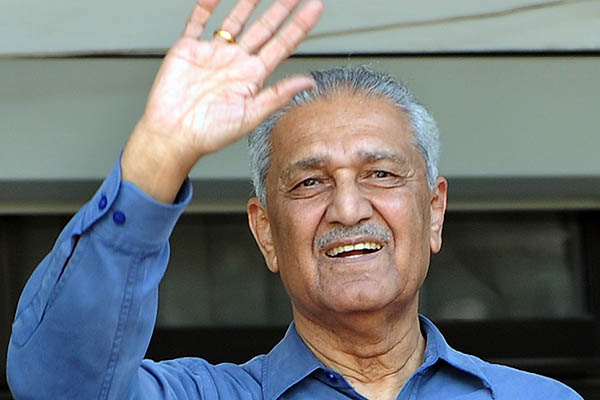
File photo. Aamir Qureshi—AFP
Condolences pour in for the ‘father’ of Pakistan’s nuclear program, with his burial receiving full state honors
Abdul Qadeer Khan, popularly known as the “father” of Pakistan’s atomic weapons program, died in Islamabad on Sunday. He was 85.
Khan’s funeral prayers were offered at the federal capital’s Faisal Mosque with full state honors and was attended by several influential personalities, including members of the federal cabinet, parliamentarians, and military officials. Prime Minister Imran Khan expressed his condolences on the scientist’s demise, but did not attend the funeral prayers—despite Interior Minister Sheikh Rashid Ahmed announcing that he had directed all his cabinet members to participate.
Some segments of media erroneously reported that Khan had died of COVID-19, but sources within his family said that while he had contracted the illness last month, he had been discharged from hospital and allowed to return home after a full recovery. On Saturday night, they said, he had suddenly developed breathing problems and passed away shortly after being transferred to a nearby hospital.
Khan, widely known as Dr. A. Q. Khan, was regarded as a national hero in Pakistan for helping the nation become a nuclear power—but the same actions saw him vilified in the West. In the U.S., Khan was known for illegally selling nuclear technology to nations such as North Korea and Iran; and was placed under house arrest for 5 years—from 2004 to 2009—in Islamabad at the urging of American authorities. The U.S. State Department had alleged that Khan used to operate an “extensive international network for the proliferation of nuclear equipment and know-how that provided one stop shopping for countries seeking to develop nuclear weapons.”
Analysts and U.N. officials have said his illicit network created the greatest nuclear proliferation crisis of the atomic age. He confessed to the crimes on national television and was eventually pardoned by then-president Pervez Musharraf. In his confession, Khan said he acted alone without the knowledge of state officials. Later, he recanted and claimed he had been scapegoated.
Khan also briefly flirted with politics, forming the Tehreek-e-Tahaffuz-e-Pakistan, which he said would “bring change” and help the people of Pakistan.
Condolences
Following the announcement of Khan’s death, people across Pakistan conveyed their condolences on his passing and hailed him for his contributions to the country. President Arif Alvi, in a statement on Twitter, expressed sorrow over the demise and said Dr. A. Q. Khan had helped Pakistan develop “nation-saving nuclear deterrence.”
In his message, the prime minister said he was “deeply saddened” by the news and said that the scientist had been loved by Pakistanis because of his “critical contributions” in making the country a nuclear power. “This has provided us security against an aggressive much larger nuclear neighbor. For the people of Pakistan he was a national icon,” he added.
Army chief Gen. Qamar Javed Bajwa said that Dr. Khan’s contributions toward strengthening Pakistan’s defense were “significant.” According to a statement issued by the Inter-Services Public Relations, the chairman of the joint chiefs of staff committee and all services chiefs also expressed sorrow over the demise of the nuclear scientist.
Opposition Leader in the National Assembly Shahbaz Sharif described Khan’s death as a “huge loss” for Pakistan. Similarly, PPP Chairman Bilawal Bhutto Zardari said Pakistan would remain indebted to Dr. Khan for his “unforgettable” services.
